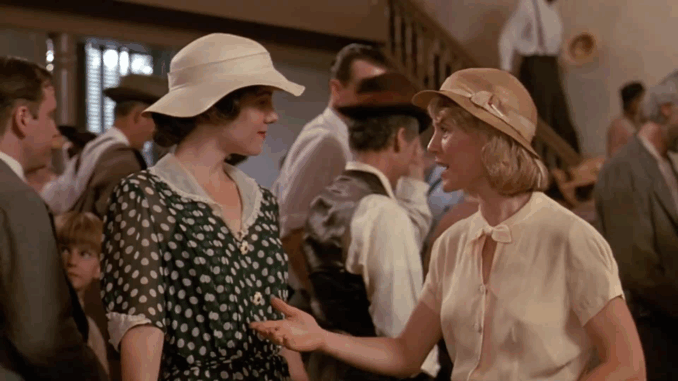
In a quiet moment in Fried Green Tomatoes, a simple object reveals the weight of trust, love, and sacrifice: a Bible. It isn’t just a prop — it’s a vessel of secrets, salvation, and survival. Tucked inside are money and a letter — small inclusions, but monumental in meaning. This isn’t just about Ruth’s faith. It’s about escape, loyalty, and the complicated forms love can take.
More Than Religion: A Bible of Strategy and Survival
When Ruth flees her abusive husband Frank Bennett to join Idgie in Whistle Stop, she carries with her the Bible — a symbol of traditional Southern womanhood, faith, and domesticity. But inside is something quietly radical: cash and a note, preparing her for a new life. In a world where women had little autonomy and even fewer resources, hiding emergency funds in a Bible is not only clever — it’s life-saving.
This moment reflects how Ruth is evolving: no longer passive or pious in the way society expects, but quietly resourceful and brave. The Bible remains close to her, but now it holds the tools for transformation — not just spiritual, but tangible and urgent.
The Hidden Letter: Words Unspoken, Love Revealed

Tucked inside the same book is a letter, often understood by viewers to be written by Idgie. Though the contents are not fully revealed on screen, the act of placing it in the Bible speaks volumes. The message is intimate, careful, and coded — just like the relationship between Idgie and Ruth.
Their love, which resided outside of conventional norms, needed protection. A letter in a Bible is a paradox: sacred words folded inside sacred scripture. It’s a way of preserving something too dangerous to say aloud — yet too meaningful to leave unsaid.
Symbol of Safety, Resistance, and Silent Rebellion
This act of hiding — money, a letter, and perhaps even identity — turns the Bible into a symbol of quiet rebellion. It’s a move that blends survivalism with sentiment. Ruth doesn’t throw away her past; she integrates it into her escape. And in doing so, she reclaims her story — not as a victim, but as a woman in motion, in charge, in transition.
The Bible remains by her side even as she builds a new life with Idgie. In a way, it holds her old world and her new one — bridging tradition and transformation.
A Book That Carried More Than Pages
In Fried Green Tomatoes, the Bible isn’t just a religious artifact. It’s a vessel of agency, courage, and encoded devotion. In Ruth’s hands, it becomes a suitcase for escape, a box of memory, and a testament to a love that dared not speak its name — but lived quietly between verses and pages.
It reminds us that sometimes the most radical acts are wrapped in the most familiar objects. And that faith, when intertwined with love and courage, can look very different from what the world expects.
